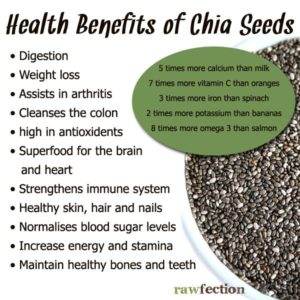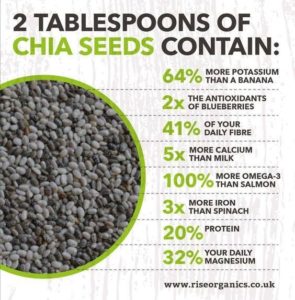
We previously considered chia seeds (both Salvia hispanica and Salvia and Salvia sclarea) as excellent sources of ALA in a blog on non-fish-based omega-3 fatty acids 1 . But these amazing little seeds just can’t stop giving. They also appear to have significant benefit benefit if you have type 2 diabetes. But you need to look at final thoughts to get the whole picture from ground level.
This was seen in a double-blind randomised controlled trial 2 which looked at whether the humble chia seed (Salvia hispanica L.) could help in the treatment of overweight and obese patients who have type 2 diabetes.
Blog Contents
Aim of the study
The researchers considered that Salba-chia 3 (a white variant of the black Salvia hispanica species), an ancient seed, improves management of type 2 diabetes and suppresses appetite. It just happens that they used the white variety, it wouldn’t have mattered if they had used the black variety. In fact, Dr Greger argues 4 that the black variety is even more beneficial to human health.
The aim of this study was to assess the effect of chia on body weight, visceral obesity and obesity-related risk factors in overweight and obese adults with type 2 diabetes.
Study method
This was a 6-month long double-blind, randomised, controlled trial which used two groups of overweight/obese patients with type 2 diabetes.
Each group had a calorie-restricted diet:
test group received 30 g/1000 kcal/day of chia seeds
control group received 36 g/1000 kcal/day of an oat bran-based alternative
Changes in the following would be measured at the end of the study:
- body weight
- waist circumference
- body composition
- glycaemic control 5
- C-reactive protein 6
- obesity-related satiety hormones 7
Study results
When tested after 6 months, the following results were found:
- chia group had lost more weight than control group
- chia group had a greater reduction in waist circumference than control group
- chia group had a reduction in C-reactive protein compared with control group
- chia group had increase in plasma adiponectin 8 levels compared with control group
Study conclusions
“The results of this study, support the beneficial role of Salba-chia seeds in promoting weight loss and improvements of obesity related risk factors, while maintaining good glycemic control. Supplementation of Salba-chia may be a useful dietary addition to conventional therapy in the management of obesity in diabetes.”
Final thoughts
What’s really important in this study, which is not made clear in the above abstract, is that the chia seeds used were not whole. Rather, they were ground chia seeds. This is something that also applies to reached that has been undertaken on flax seeds which have such a tough shell that they largely pass straight through your body with all that potential goodness ending up in the toilet bowl. Some previous research 9 into the efficacy of chia seeds did not manage to get the same positive results simply because the seeds were consumed whole instead of ground. “It ain’t what you do it’s the way that you do it!”
So, if you want the benefits outlined above, I strongly advise that you grind up your chia and flaxseeds before adding them to your morning muesli or any of the other meals during the day where you would (I hope) use lots of these two miracle seeds. And, by the way, avoid sprouting chia seeds, particularly ground chia seeds, since research 10 has shown they are pretty good at growing salmonella as well!
Oh, and one more helpful benefit of chia seeds is that they have been shown 11 to reduce appetite – hence reducing the number of calories that people eat. Just one teaspoon of chia a day (50 Kcal) appeared to be enough to reduce what subjects ate afterwards by as much as 300 Kcal).
And two tablespoons of chia seeds a day (ideally ground):

References
- Non-Fish Sources of Omega-3 [↩]
- Nutr Metab Cardiovasc Dis. 2017 Feb;27(2):138-146. doi: 10.1016/j.numecd.2016.11.124. Epub 2016 Dec 9. Salba-chia (Salvia hispanica L.) in the treatment of overweight and obese patients with type 2 diabetes: A double-blind randomized controlled trial. Vuksan V1, Jenkins AL2, Brissette C3, Choleva L3, Jovanovski E3, Gibbs AL4, Bazinet RP5, Au-Yeung F3, Zurbau A3, Ho HV3, Duvnjak L6, Sievenpiper JL7, Josse RG8, Hanna A [↩]
- Livestrong.com: Comparison of Chia & Salba [↩]
- Video: Do Chia Seeds Help with Belly Fat? Michael Greger M.D. FACLM June 29th, 2018 Volume 42 [↩]
- Medical Dictionary: Definition of glycaemic control [↩]
- Mayo Clinic: C-reactive protein test [↩]
- Medical News Today: Obesity: Lack of ‘satiety hormones’ plays a role [↩]
- Adiponectin regulates glucose levels and fatty acid breakdown: Wikipedia [↩]
- Nieman DC, Cayea EJ, Austin MD, Henson DA, Mcanulty SR, Jin F. Chia seed does not promote weight loss or alter disease risk factors in overweight adults. Nutr Res. 2009;29(6):414-8. [↩]
- Harvey RR, Heiman marshall KE, Burnworth L, et al. International outbreak of multiple Salmonella serotype infections linked to sprouted chia seed powder – USA and Canada, 2013-2014. Epidemiol Infect. 2017;145(8):1535-1544. [↩]
- Ayaz A, Akyol A, Inan-eroglu E, Kabasakal cetin A, Samur G, Akbiyik F. Chia seed () added yogurt reduces short-term food intake and increases satiety: randomised controlled trial. Nutr Res Pract. 2017;11(5):412-418. [↩]